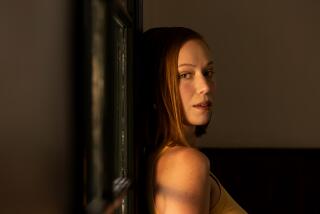Trying to connect
Strange is all in the eye of the beholder. At first blush, Aimee Bender’s stories seem plucked from the same collective id that produced David Lynch’s most eccentric films and the metaphysical sci-fi of Philip K. Dick. Peopled by garish, often grotesque characters who fumble and struggle their way through life, Bender’s fiction is too easily shunted into some hazy genus of literary surrealism.
“Surreal” is a word that critics have often used when describing Bender’s work, which includes her debut short-story collection, “The Girl in the Flammable Skirt,” and her novel, “An Invisible Sign of My Own.” It implies a kind of distancing effect, a clever stratagem to mask real emotions with a scrim of gratuitous weirdness.
But look closer at Bender’s stories and the dream logic comes into sharper focus. What Bender is grappling with in her stories are the struggles of outsiders and outcasts -- however cruel and heedless they might be -- trying to make some real human connection in an unforgiving world. Her freaks, in short, are all too human.
“For some readers, my stories are distancing,” says Bender, 36, who is picking over a bowl of tuna salad in a Brentwood cafe. She is affable and charmingly self-effacing, the very model of normalcy. “But my hope is that they can be an access point for readers. Isn’t that the deal with life, the way we lunge toward some connection with people, and how we succeed and fail? It’s interesting to look at the various nuances of that.”
Bender’s latest book, “Willful Creatures,” is a collection of stories in which protagonists have to negotiate the dissonance that exists between how they feel and how others feel about them. In “Ironhead,” a couple with pumpkin heads give birth to a boy with a too-heavy iron for a head, a “silver model with a black plastic handle.” In “Death,” a single woman develops maternal instincts for a pot of potatoes. The female partygoer in “Off” wants to make out with three men but winds up the victim of her own desperation. Taken out of context, the stories might seem trite or facile. But Bender’s empathy for her characters, her generosity of spirit, gives her fiction an undertow of pathos.
Italo Calvino, the late Italian writer who spun out entire universes in his allegorical fables, is an inspiration. Bender’s more fanciful stories, too, veer into playful allegory. “Calvino’s stories are so joyful,” says Bender, who also teaches creative writing at USC. “I think of him and Donald Barthelme as having this incredibly sharp intellect, alongside humanity and a very loving kind of humor. There’s still hope for people in their stories, which matches my worldview.”
Bender’s stories are like fractured fairy tales for adults, but she’s no fabulist. Her parched, spare prose gives her stories a deadpan, matter-of-fact directness that makes even the most outlandish conceits believable. “I’m always paring down my stories. I don’t like to have a lot of extra stuff in a paragraph. It feels good when I clear things out.”
As for the bizarre elements in her work, Bender recalls something Flannery O’Connor wrote: “By exaggerating the grotesque, you’re just pushing what already exists, but you can see it more clearly when it’s pushed.”
Bender is a fan of magic realism, particularly Gabriel Garcia Marquez, but her work leans more toward the stranger aspects of prosaic life, especially her stories “Debbieland” and “Jinx,” which deal with the fraught dynamics of teenage girls and their body-image issues.
“When you’re a teenager, it’s like magic realism is happening on the body,” she says. “You’re physically manifesting change in a way that’s unlike any other time in your life. It’s interesting to write about, and to watch.”
As a teenager attending Pacific Palisades High School, Bender was “kind of under the radar. I was somewhat checked out.” She wrote stories all through high school and as an undergraduate at UC San Diego, where she studied theater. But it wasn’t until she enrolled in a master of fine arts program at UC Irvine that she began seriously thinking about writing as a career.
“I thought my style would get beaten out of me,” she says. “So I started writing what I thought might be literary fiction, and it was dumb!” Mercifully, Bender’s teachers, who included acclaimed novelist Geoffrey Wolff, encouraged her to stick with her strengths and cultivate her voice. “It was a huge shock getting that kind of support from teachers and fellow students,” says Bender.
She sold her first story to Threepenny Review in 1994, but it took her three years before she sold another. “I thought I was through the gates, but it turned out there were a lot more gates,” she says. It was a story called “Fugue,” which was included in the anthology “Absolute Disaster,” that got her across the publishing threshold when Doubleday editor Bill Thomas spotted it and gave Bender a call.
“Willful Creatures” is Bender’s third book, though she was hoping it would be her fourth. She’d had another novel in the works but had to put it aside when she realized it wasn’t clicking. “I felt sad,” says Bender. “But the moment when you admit something’s broken and leave it is better than trying to hold together a broken thing.”
Early critical coverage indicates that the collection holds together quite nicely. Publishers Weekly, which gave the book a starred review, called “Willful Creatures” a “daringly original collection” that strikes a balance between “earthy heartbreak and otherworldly strangeness.”
While the positive notices accumulate, Bender says she will think about new stories, perhaps another novel, and watch for the ways in which the human comedy plays out on the streets of her Hollywood neighborhood. “There’s a whole spectrum of ways in which people can fail to connect with each other. That can provide a lot of material.”
More to Read
Sign up for our Book Club newsletter
Get the latest news, events and more from the Los Angeles Times Book Club, and help us get L.A. reading and talking.
You may occasionally receive promotional content from the Los Angeles Times.






